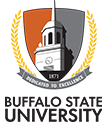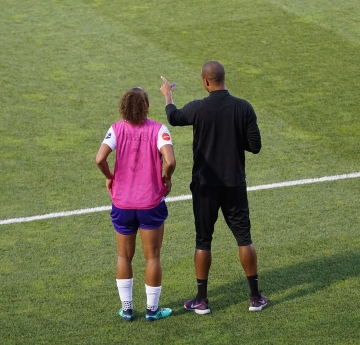Our Programs
Graduate Programs
Accelerated Pathways
Accelerated pathways offer qualified undergraduates the opportunity to expedite the acquisition of their master’s degree by beginning graduate coursework, at undergraduate tuition rates, in their senior years of study.
Dietetics Combined Pathway (BS and MS)
The Dietetics Combined Pathway (BS and MS) pathway has been established to offer highly qualified SUNY Buffalo State University students the opportunity to expedite completion of requirements for eligibility to take the registered dietitian nutritionist (RDN) registration examination, including a master’s degree.
About the Pathway
Enrollment in a combined pathway allows highly qualified, current SUNY Buffalo State University students to work on the Master of Science in Dietetics while completing the bachelor’s degree. Twelve credits of designated master’s courses are incorporated into the bachelor’s degree program and count toward both the bachelor’s degree and the master’s degree. The undergraduate portion of the pathway is in-person. The graduate year is online.
The Dietetics Combined Pathway has been accredited by the Accreditation Council for Education in Nutrition and Dietetics (ACEND) as Future Education Model (FEM) graduate program (ACEND FEM Graduate Standards). FEM accreditation standards integrate didactic coursework with supervised experiential learning in a competency-based curriculum designed to prepare graduates for future practice. Effective January 1, 2024, the Commission on Dietetic Registration (CDR) requires completion of an ACEND accredited program, 1000 hours of supervised experiential learning, and a minimum of a master’s degree to be eligible to take the credentialing exam to become a registered dietitian nutritionist (RDN). The Buffalo State University Dietetics Combined Pathway (BS and MS) satisfies all CDR requirements to sit for the RDN examination as well as the New York State Office of the Professions requirements for the Certified Dietitian Nutritionist (CDN) credential.
The following information may be found in the student handbook (link below): description of the program, requirements to earn a verification statement, mission/goals/objectives, academic roadmap, policy for good standing, standards for appearance, professional liability insurance, mandatory health insurance, health requirements, costs to students, distance education components, financial aid/scholarships, library resources, statement on outside employment, registration process and the RDN exam, and code of ethics.
Dietetics Combined Pathway (BS and MS) Handbook
State Licensure and Certification
Mission, Goals, and Objectives
Outcome data are available upon request
Apply
Admission into the combined pathway is highly selective. Matriculated undergraduate or transfer students may apply to the B.S. and M.S. pathway for a junior year start. The application process includes : 1) minimum GPA of 2.75 for the undergraduate portion of the pathway, 2) completion of prerequisite courses specified for the BS, Dietetics, 3) two letters of recommendation, 4) two faculty interviews, and 5) a personal statement. Advancement to the master’s portion of the pathway, requires a GPA 3.0 and completion of the BS, Dietetics.
Dietetics Combined Pathway (BS and MS) Admission Requirements
All students with sophomore, junior, or senior status meeting the eligibility requirements must apply for admission to the BS, Dietetics portion of the pathway during the designated period. Eligibility requirements for application to the pathway are admission to Buffalo State University, a minimum cumulative GPA 2.75, and potential for completing of the following prerequisite courses prior to beginning the program in the fall:
BIO 100 Principles of Biology
BIO 308 Human Anatomy and Physiology I
BIO 309 Human Anatomy and Physiology Lab
CHE 111 Fundamentals of Chemistry I
CHE 113 Laboratory for Fundamentals of Chemistry I
CHE 112 Fundamentals of Chemistry II
CHE 114 Laboratory for Fundamentals of Chemistry II
CHE 201 Organic Chemistry I
CHE 203 Organic Chemistry I Laboratory
CHE 322 Biological Chemistry
NFS 100 Introduction to Food Preparation
NFS 102 Introductory Nutrition
NFS 200 Applied Food Chemistry
NFS 211 Applied Management in Dietetics I
NFS 230 Introduction to Dietetics
NFS 302 Advanced Nutrition
NFS 315 Life Cycle and Community Nutrition I
PSY 101 Introduction to Psychology
Program Requirements
The combined pathway requires 140 credits total, of which 30 are master’s credits leading to the M.S. in Dietetics. Students who complete the pathway become eligible to sit for the RDN credentialing exam as the pathway includes 1000 hours of experiential learning and ACEND required competencies.
The program requires careful planning that should begin in the first year of the student’s undergraduate career at SUNY Buffalo State University. The student and their primary advisor must consult each semester in planning the undergraduate degree program so that these requirements are met with 12 required credits of master’s courses. Students must meet graduate expectations for academic progress and grade point average to remain in the combined pathway.
Dietetics, B.S.
General Education 21 Requirements
Required Undergraduate courses for the major
NFS 100 INTRODUCTION TO FOOD PREPARATION 3
NFS 102 INTRODUCTORY NUTRITION 3
NFS 200 APPLIED FOOD CHEMISTRY 1
NFS 211 APPLIED MANAGEMENT IN DIETETICS I 3
NFS 230 INTRODUCTION TO DIETETICS 2
NFS 302 ADVANCED NUTRITION 3
NFS 311 APPLIED MANAGEMENT IN DIETETICS II 3
NFS 315 LIFE CYCLE AND COMMUNITY NUTITION I 3
NFS 316 LIFE CYCLE AND COMMUNITY NUTRITION II 3
NFS 330 INTEGRATIVE AND FUNCTIONAL NUTRITION 1
NFS 401 MEDICAL NUTRITIONAL THERAPY I 4
NFS 402 MEDICAL NUTRITIONAL THERAPY II 3
NFS 403 MEDICAL NUTRITIONAL THERAPY III 3
NFS 405 PRINCIPLES OF NUTRITION EDUCATION 2
NFS 430 INTRODUCTION TO NUTRITION RESEARCH 3
NFS 445 NUTRITION CARE A 3
NFS 446 NUTRITION CARE B 3
NFS 447 NUTRITION CARE C 3
NFS 448 NUTRITION CARE D 4
NFS 449 NUTRITIONAL CARE E (NUTRITIONAL CARE OF LONG-TERM PATIENTS) 3
Required courses outside the major (32 credit hours)
BIO 100 PRINCIPLES OF BIOLOGY 3
BIO 308 SURVEY OF HUMAN ANATAOMY AND PHYSIOLOGY 3
BIO 309 LABORATORY SURVEY OF HUMAN ANATOMY AND PHYSIOLOGY 1
BIO 355 SURVEY OF MICROBIOLOGY 3
CHE 111/113 FUNDAMENTALS OF CHEMISTRY 1 /Lab 4
CHE 112/114 FUNDAMENTALS OF CHEMISTRY II /Lab 4
CHE 201 ORGANIC CHEMISTRY I 3
CHE 203 ORGANIC CHEMISTRY 1 LAB 1
CHE 322 BIOLOGICAL CHEMISTRY 4
MAT 311 INTRODUCTORY PROBABILITY AND STATISTICS (or equivalent) 3
PSY 101 INTRODUCTION TO PSYCHOLOGY 3
Required Graduate Courses (12 credit hours)
NFS 571 EXPIERIENTAL LEARNING IN FOOD SERVICES SYSTEMS IN HEALTH CARE 3
NFS 605 CURRENT TRENDS IN NUTRITION * 3
NFS 689 METHODS OF NUTRITIONAL RESEARCH * 3
HEW 605 EPIDEMIOLOGY * 3
Total Credit Hours 122
Dietetics M.S.
Required Graduate courses (30 credit hours)
NFS 571 EXPIERIENTAL LEARNING IN FOOD SERVICES SYSTEMS IN HEALTH CARE 3
NFS 601 LEADERSHIP AND PROJECT MANAGEMENT IN DIETETICS 3
NFS 605 CURRENT TRENDS IN NTURITION * 3
HEW 605 EPIDEMIOLOGY * 3
NFS 607 EXPERIENTIAL LEARNING IN WEIGHT MANAGEMENT AND DIABETES PREVENTION AND TREATMENT 3
NFS 609 EXPERIENTIAL LEARNING IN ADVANCED MEDICAL NUTRITION THERAPY 3
NFS 612 NUTRITION COUNSELING 3
NFS 689 METHODS OF NUTRITIONAL RESEARCH * 3
NFS 690 MASTER’S PROJECT 3
Graduate Electives 3
NFS 550 GRADUATE PRACTICUM IN DIETETICS 3
Total Graduate Credit Hours 30
*Courses used in the B.S. and M.S. simultaneously
Technology Requirements
- Technology requirements for distance education - The following are technical requirements needed for satisfactory completion of the pathway
- Daily access to a computer with video camera and microphone with internet access
- Word processing and presentation software skills (Download software here))
More Information
Health, Nutrition, and Dietetics Department
Dr. Tina Colaizzo-Anas Ph.D, RD-AP, CDN, CNSC, FAND
Associate Professor and Director, Dietetics Combined Pathway (BS and MS)
Caudell Hall 341
(716) 878-5818
colaiztm@buffalostate.edu
The 4+1 accelerated pathway in health and wellness and adult education offers qualified health and wellness undergraduates the opportunity to expedite the acquisition of the master’s of science in adult education degree.
About the Pathway
The Adult Education and Health and Wellness departments have collaborated to create the Health and Wellness and Adult Education Accelerated Undergraduate to Graduate 4+1 Pathway, which allows students to focus their adult education coursework in ways that complement their content knowledge in health and wellness as they work in community organizations, colleges and universities, health departments, or businesses.
This joint pathway has been established to support health and wellness graduates with knowledge about teaching and training adults that will make them better prepared to serve in many roles, such as health coaches, public health educators, corporate wellness coordinators, and health services managers. The 4+1 pathway provides qualified health and wellness undergraduate students a seamless entry into the M.S. in adult education.
Through the 4+1 accelerated pathway, undergraduates in Health, Nutrition, and Dietetics apply for conditional admission to the Graduate School and complete 9 hours of graduate coursework in the master’s of science in adult education degree program during their senior year of undergraduate study. A maximum of 9 credit hours (divided between the first and second semester of the senior year) may be taken during the senior year, and these credits are included in the undergraduate tuition rates students pay. Students must maintain academic eligibility, as outlined by the admission requirements into the pathway, throughout the senior year.
Apply
Students enter the 4+1 pathway either as incoming freshmen or at any point in their undergraduate degree program. To apply, please download and complete the application and approval form from the Adult Education Department website.
More Information
Health, Nutrition, and Dietetics Department
Dr. Catherine Cardina
Chair and Associate Professor
Caudell Hall 350B
(716) 878-3218
cardinac@buffalostate.edu
This accelerated pathway has been established to offer qualified undergraduates the opportunity to expedite the acquisition of a master’s degree which will be required for their field.
About the Pathway
The Adult Education Department and the Health, Nutrition, and Dietetics Department have collaborated to create an undergraduate- to-graduate pathway that allows students to focus their graduate adult education coursework in ways that compliment their undergraduate content knowledge in health, nutrition, and dietetics.
This joint pathway has been established to support dietetic professionals who are required to earn a master’s degree when graduating in or after 2024, prior to entering the field. The 4+1 accelerated pathway provides qualified undergraduate students with a seamless entry into the master of science in adult education degree program.
Through the 4+1 accelerated pathway, undergraduates in health, nutrition, and dietetics, can apply for conditional admission to graduate school and complete 9 hours of graduate coursework in the master of science in adult education degree program once they have earned sufficient academic credits to obtain "senior status" on their degree works report. A maximum of 9 credit hours (divided between the first and second semester of the senior year) may be taken during the senior year, and these credits are included in the undergraduate tuition rates students pay. Students must maintain academic eligibility, as outlined by the admission requirements into the pathway, throughout their senior year.
Students are formally admitted to the Graduate School following verification of bachelor’s degree requirements and acceptance of the online application. Upon formal admission, earned graduate credit is applied to the graduate course of study and all graduate policies and privileges apply. Graduate application fees are waived for students in the 4+1 accelerated pathway.
Apply
To apply for the 4+1 accelerated pathway, please download and complete the application from the Adult Education Department website at adulteducation.buffalostate.edu.
More Information
Health, Nutrition, and Dietetics Department
Dr. Catherine Cardina
Chair and Associate Professor
Caudell Hall 350B
(716) 878-3218
cardinac@buffalostate.edu








